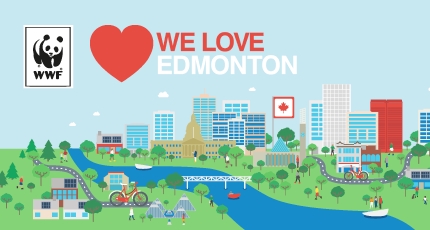Greening Edmonton
Written by Mark Brostrom, Director, Office of Environment, City of Edmonton
The City of Edmonton – along with North Vancouver and Surrey, BC – is one of three city finalists in the running for Canada’s national Earth Hour Capital award. Mark Brostrom, director of Edmonton’s Office of the Environment, tells us being green isn’t easy; neither is understanding what citizens want their city to be when it grows up. But the two, he says, are closely linked, and a top priority for Edmonton as it moves toward an increasingly sustainable future.
Edmonton was incorporated as a city in 1904 which makes us relatively young compared to the rest of the world. We are building on what we have, being mindful of our past, but also keeping an eye far into the future.

This, too, creates challenges as we try to make decisions now that will deliberately propel us towards sustainability. Our forefathers likely didn’t include sustainability in their planning and forecasting but the decisions they made were future-focused and set us on a desirable path. We have mature neighbourhoods lined with big old trees. They’re close to schools and bus routes, and include markets and small stores that add a feeling of community.
Continuous improvement is a never ending battle. But in some areas our city is already a nation’s leader. Today, the Edmonton Waste Management Centre is world-class, attracting visitors from around the world to learn how we became world leaders in managing waste. We capture landfill gas, recycle electronic equipment, have numerous eco-recycling stations and convert waste to compost. We’re also in the process of completing a pilot plant to recover fuel from waste. This will close the loop on providing fuel for our waste collection trucks. When this is done we’ll divert 90 per cent of our municipal waste from our landfill.
Our water treatment facilities are also world class. EPCOR, our municipally owned water utility, has encouraged water conservation in the community with a track record of lowering individual water consumption to 230 litres per person per day. And it has reduced overall system water losses to less than three per cent. The Canadian average consumption is 266 litres per person per day.
Edmonton also has plans to design and develop a 217 hectare parcel of land in the middle of the city. Formerly a central city airport zone, Blatchford will be developed in phases to become a sustainable, carbon neutral community, capable of housing 30-thousand people.
We have not yet reached the pinnacle of sustainability but our efforts are leading us in that direction. We can be proud of our future plans to build more light rail transit (LRT), double our urban forest canopy, develop a sustainable community within the city, and maintain world-class waste and water management systems.
Edmonton is undergoing a transformation. These initiatives don’t even include the incredible efforts of citizens across the entire city: builders providing citizens with options to purchase durable, energy-efficient homes; thriving community leagues; organizations that support innovation and entrepreneurship; and top-notch research facilities and learning institutions.
So, while we may not be an old city, we have enough sustainability efforts happening right now to fill volumes of history books for years to come!
Vote for your favourite cities, share what you love about them via photos and videos, and submit suggestions for how they can become more sustainable. Show your support for the impressive efforts our 33 finalist cities are making towards sustainability.
